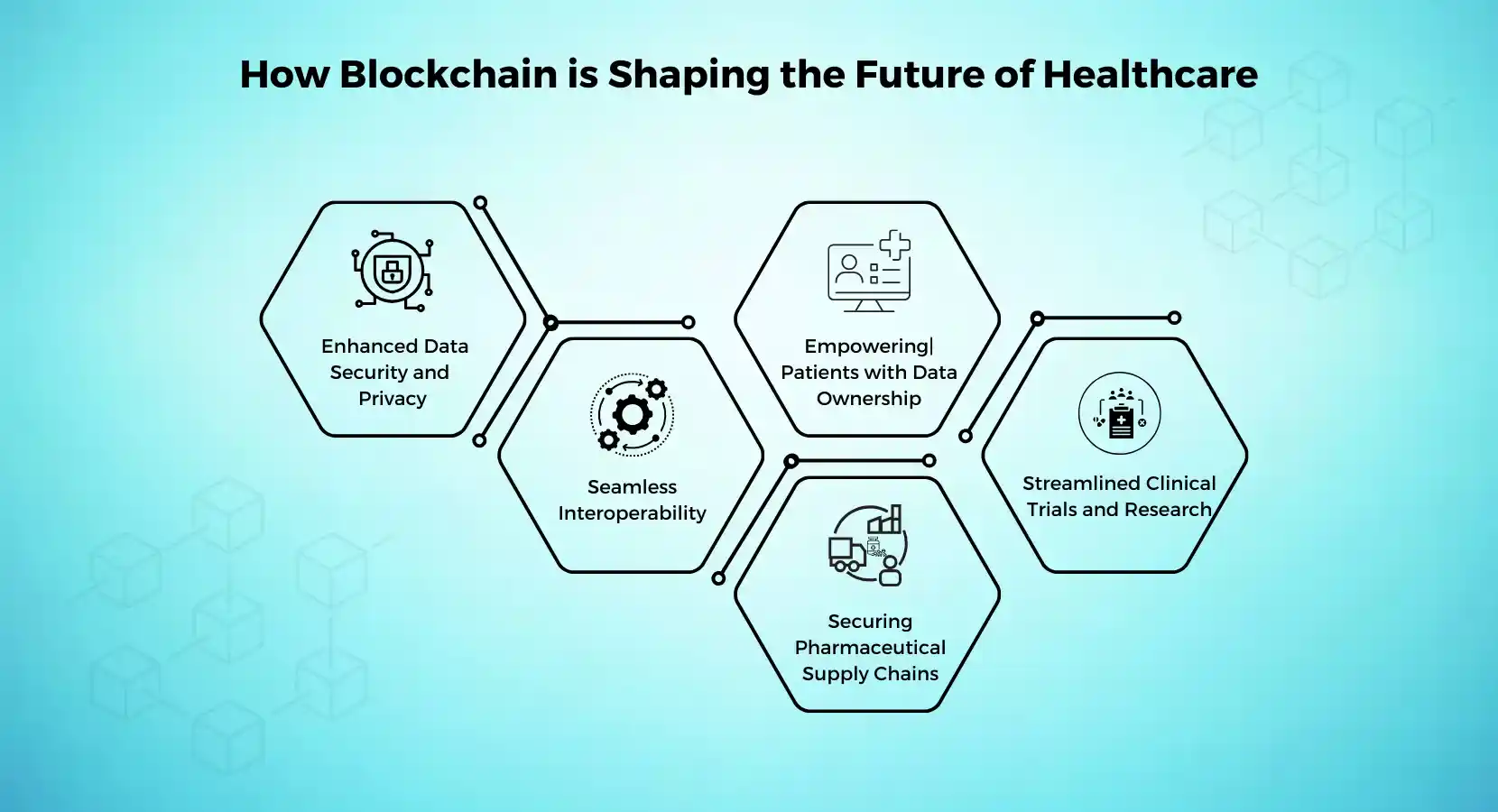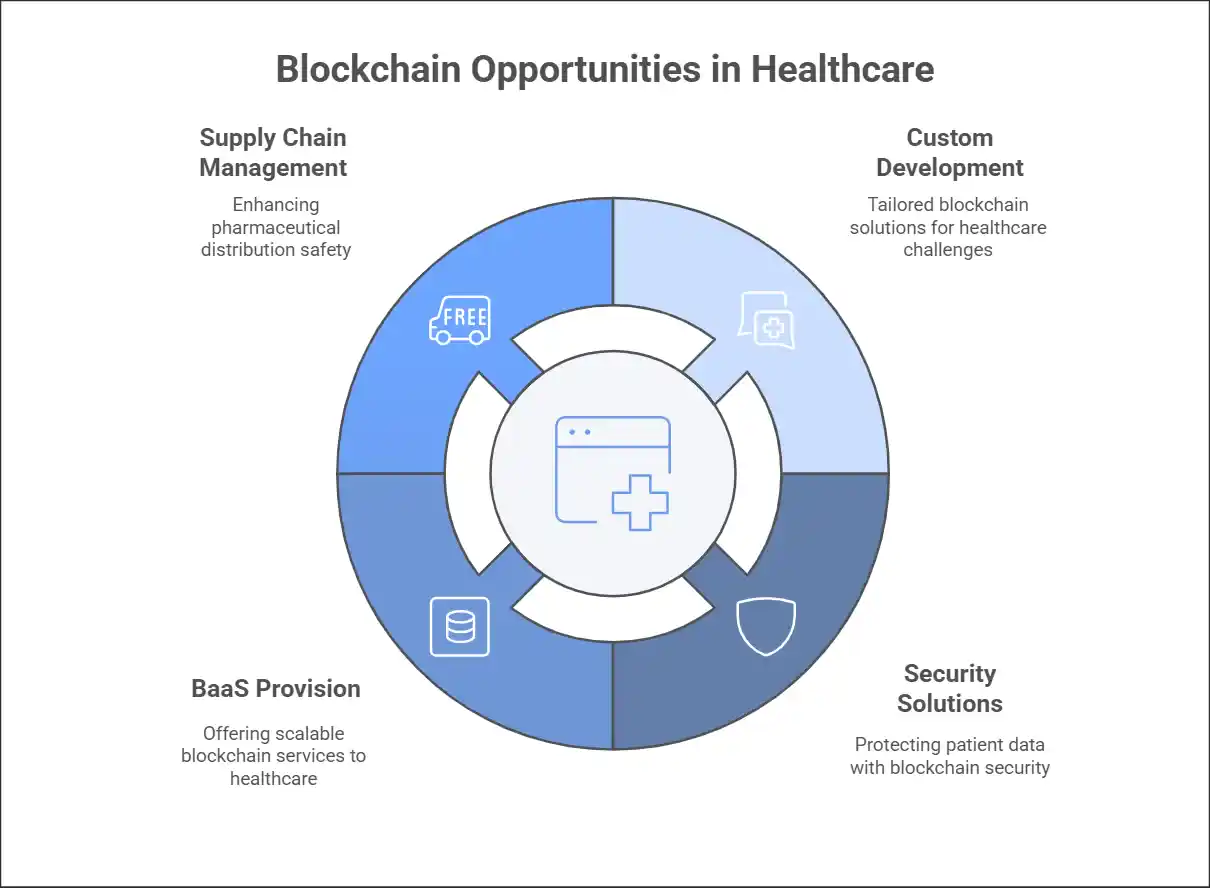Table of Contents
Did you know that the international blockchain in the healthcare industry will hit $25.52 billion by 2034? This isn’t growth for the sake of buzzwords—it’s growth that changes the way we save, share, and secure sensitive health information. In an era where data breaches seem to be the new normal, our need for secure, streamlined, and transparent systems has never been stronger. This is where blockchain comes in.
What is Blockchain in Healthcare?
Blockchain healthcare is not all about cryptocurrency. Blockchain at its simplest level is a distributed digital ledger that can record transactions on many different computers securely. That is, data cannot be altered or corrupted after it has been written down, and this makes blockchain ideal for protecting sensitive medical data.
In health, it can be used to store electronic health records, manage drug supply chains, and even maintain data integrity in clinical trials. By breaking the centralized control, blockchain makes security, transparency, and trust better.
Why Blockchain is Needed in Healthcare
The healthcare sector has various challenges that blockchain technology can address:
- Data Breaches: Healthcare data breaches revealed more than 50 million patient records in 2023 alone. Conventional centralized systems are susceptible to cyber-attacks.
- Interoperability Challenges: Various health systems have trouble communicating with each other, causing disjointed patient care.
- Absence of Patient Control: Patients seldom have much influence over who may view their medical information.
These pain points highlight the need for a more secure, efficient, and patient-centric system—enter blockchain technology.

How Blockchain is Shaping the Future of Healthcare
The potential of blockchain in healthcare is vast, and it’s already being explored in several innovative ways:
1. Enhanced Data Security and Privacy
Blockchain stores patient data in a distributed network, and it’s almost impossible for hackers to hack into or modify information. Every transaction is encrypted and connected to the previous one, forming an unbreakable chain of data.
- Example: Healthcare professionals in the U.S. are investigating blockchain to meet HIPAA requirements through improved patient data security and confidentiality.
2. Seamless Interoperability
Blockchain allows various health systems to safely share patient data, resulting in more coordinated, efficient care. Interoperability minimizes mistakes and guarantees healthcare professionals have patients’ latest data.
- Example: Blockchain platforms such as MedRec are already making seamless data transfer between hospitals and clinics possible.
3. Empowering Patients with Data Ownership
In the conventional healthcare system, patients do not have much control over their data. Blockchain reverses this by enabling patients to own and control their health records. They can authorize or withdraw access to their data, with full transparency and consent.
- Example: Organizations such as BurstIQ empower patients to take control of their health data, increasing patient trust and participation.
4. Streamlined Clinical Trials and Research
Clinical trials consist of enormous amounts of data that have to be tamper-proof and open. Blockchain makes clinical trial data traceable and guaranteed to be of integrity, minimizing fraud and accelerating the new drug approval process.
- Example: Pfizer and other big pharma are looking to leverage blockchain to enhance clinical trial management of data.
5. Securing Pharmaceutical Supply Chains
Counterfeit medicines cost the world pharmaceutical industry billions of dollars annually and pose a threat to patient safety. Blockchain allows drugs to be traced from manufacturer to patient, guaranteeing authenticity and minimizing fraud.
- Example: The MediLedger Network employs blockchain to trace pharmaceuticals, guaranteeing drug safety and compliance.
Challenges to Blockchain Adoption in Healthcare
While the future of blockchain in healthcare is promising, some challenges must be addressed:
- Scalability Problems: As health data increases, it is important that blockchain networks are scalable to accommodate vast amounts.
- Regulatory Compliance: Compliance with intricate healthcare regulations such as HIPAA and GDPR is critical for blockchain adoption.
- Integration with Current Systems: Blockchain technologies need to integrate harmoniously with existing healthcare IT systems.
- High Expenses and Knowledge Deficit: There is a high expense involved in installing blockchain systems, and fewer professionals with the required expertise in this new area are available.
Future Trends
The future of blockchain in healthcare is filled with exciting possibilities:
- AI Integration: Merging blockchain with Artificial Intelligence has the potential to transform data analysis while maintaining data integrity and security.
- Smart Contracts in Insurance: Blockchain-based smart contracts can make insurance claims automated, minimizing fraud and administrative expenses.
- Global Health Data Sharing: Blockchain can make safe cross-border health data sharing possible, allowing for medical research and enhancing patient outcomes globally.
- Personalized Healthcare: Secure data sharing enables healthcare professionals to view in-depth patient histories, resulting in tailored and effective treatments.
Business Opportunities in Blockchain Healthcare
For IT service providers, the emergence of blockchain in healthcare offers business opportunities. Through your technological capabilities, you can access this expanding market through the following channels:
1. Custom Blockchain Development and Integration
Healthcare organizations seek customized blockchain solutions to address their unique requirements, including secure patient data management and interoperability. As an IT service provider, you can provide:
Custom blockchain solutions for electronic health records (EHRs) and data sharing.
Integration services to link blockchain platforms with current healthcare IT infrastructure.
Smart contract development for automated insurance claims and billing.
2. Blockchain Security Solutions
Security is of utmost importance in healthcare because of the sensitive information of patients. Blockchain’s decentralized and encrypted nature offers greater security, but organizations require expert advice to deploy it successfully. Opportunities are:
Blockchain security best practices advisory and consulting services.
End-to-end security solutions such as encryption, identity management, and access control.
Compliance services to assist healthcare providers in conforming to regulation such as HIPAA and GDPR.
3. Blockchain-as-a-Service (BaaS) for Healthcare
Most healthcare organizations do not possess the resources or the skills needed to create and maintain blockchain infrastructure. Providing Blockchain-as-a-Service (BaaS) helps fill this void by offering:
Cloud-based blockchain platforms for the storage and management of healthcare data.
Scalable solutions for healthcare startups and big businesses too.
Regular maintenance and support to keep operations running seamlessly and securely.

4. Healthcare Supply Chain Solutions
The pharmaceutical supply chain is susceptible to fake drugs and inefficiencies. Blockchain’s transparent and traceable nature can address these challenges. IT service firms can leverage this by providing:
Blockchain-based supply chain management systems to track pharmaceuticals from manufacturing through delivery.
Real-time inventory management and fraud prevention solutions.
Connecting IoT devices with blockchain to provide end-to-end visibility and traceability.
Real-World Use Cases Driving the Future
Several organizations are already leading the way in blockchain healthcare innovations:
- IBM Watson Health: Works with the FDA to investigate blockchain technology for secure exchange of patient data.
- Mayo Clinic: Employs blockchain to manage clinical trial data, maintaining data transparency and integrity.
- Change Healthcare: Established a blockchain network to enable open claims processing, minimizing disputes over billing and fraud.
Conclusion
The future of blockchain in healthcare is promising, providing unparalleled security, efficiency, and patient empowerment. With increasing adoption by more organizations, we can anticipate a revolutionized healthcare system that emphasizes data integrity, transparency, and patient-centered care.
Blockchain not only has the potential to improve patient trust but also opens doors to innovative healthcare solutions that were previously impossible.
With its capacity to interface with other new technologies, such as AI and IoT, the possible uses are endless. As blockchain technology develops further, it will certainly influence the future of healthcare provision.